Feed aggregator
TigerTails Radio Season 12 Episode 17
Hindsight is 2020 — Top 20 furry news stories of last year (Part 1)

My chihuahua was amazed when I sneezed and fireworks exploded over the city. She stopped shaking and did a head tilt, like “did you do that?”
It was New Year’s Eve, and catching a plague kept me from going out. But pets like attention when there’s scary noise, and it made time to write.
This list is for articles at Dogpatch Press. That’s not the only way to get furry news, but how easy is it to get? Trust 1132 published articles here. It takes tons of work that few will do. Or ask those who start new sites, because great intentions often only last a few weeks. (RIP Good Fur News, Jan-Feb 2019).
This site has 6 years in service because it’s about DIY power, like a little sneeze really has power to make fireworks. It starts with one fan, but it needs everyone who sends tips, support, or guest writing, and makes art and events. That’s why 2020’s plans include supporting Moonraiser’s furry blog, a regular guest roundup of furry comics, and too many projects to ever finish (the site has hundreds on file).
These stories aren’t just from 2019. There’s some older ones that had revived or ongoing interest in the year. They’re not ordered by most viewed on top (some of them are deeper dives into brief/specific stories) — but these were the top 20 listed in a way that makes a snapshot of a subculture.
1. Art business and careers. Furry artists among top highest-paid Patreon creators, but face threats to their livelihood.
This 2018 article brings traffic every week. It has evergreen topics for hungry artists, like adult art business, insecurity about rules and art theft.
2. Deep wallets and love for creators. A look at furry business with a $17,017 record fursuit auction price, July 2018.
The fursuit auction record stands unbroken since 2018, and it more than doubled in 5 years. Where do sales happen now? After the end of auction site Furbid (1999-2015), Furbuy went down in 2019, leaving only The Dealer’s Den to serve the fandom until it returns.
 3. Hearts bigger than their wallets. The impact of Dogbomb on the furry fandom and charity to cure ALS.
3. Hearts bigger than their wallets. The impact of Dogbomb on the furry fandom and charity to cure ALS.
The story of Dogbomb’s life ended in April, but his afterlife goes on. It’s not just a news story, but a movement on social media, a big chunk of all fandom charity donations, and a rare level of mainstream crossover with charity events in many locations.
4. Antidote to negativity. Meet Emma the Tiger – A Showcase of Fandom Love from BLFC 2018.
This story of bullying and positive response gets steady views from some Youtube videos citing it.
5. Fierce independence. How furries resist a commercialized fandom (Parts 1-3)
It’s a deeper dive into a story that briefly hit mainstream news — When furries attack: Zweitesich criticized for marketing fursuits as expensive luxuries. A fursuit maker had a marketing misfire and got dogpiled like an invasive outsider. It connected business and bullying, with the highest ideals of independent creators and the worst excess of social media negativity. The deep dive looks at why it happened, with complicated conclusions because both DIY power and Disney-type fandom are furry roots.
6. Shared lore. Original species of furry fandom: an overview.
Rune’s guest article talks about furries creating their own worlds and species, like Dutch Angel Dragons, Sergals, or Protogens.
7. Events with style. Galactic Camp: a furry con takes flight on the USS Hornet, Feb 23, 2019.
There was a furry con on an aircraft carrier. I called it the cutting edge of turning swords to plowshares. The cool/weird factor got high notice on Reddit with Galactic Camp sets record with 742 furries, a San Francisco Bay warship and a Soviet time traveler.
8. How to get inside. A Newcomer’s Guide To Furry Terms and Customs.
The secret is there is no secret. Being a fan means doing it organically because you love it. The story is an Onion-style shitpost/prank (the site is zine style with occasional entertainment like that). It was made to satirize boring “Furry 101” news that used to be the only kind outsiders saw. This one keeps getting mistaken for the real thing.
9. Constant Queerdness. 5 STAR VISIT: Furry gets Airbnb room in San Francisco, finds furry yiff art on the wall.
It’s goofy entertainment but not a prank. An encounter with furry yiff art “in the wild” showed the queer/weird side of fandom that helps make it thrive. You could also call it loveable Furry Trash (like fun trash movies, which isn’t an insult.)
10. Classic Queerdness. Q&A with Biohazard, artist of the infamous “Too Hot for PBS” auction video.
More of the queer/weird side of fandom that makes it thrive. Your eyes could pop out to see this artist putting gay yiff art on public TV in the 1980’s before there were furry cons. Truly part of the roots, and that’s why this keeps getting views for years.
Tomorrow: stories 11-20.
Like the article? These take hard work. For more free furry news, please follow on Twitter or support not-for-profit Dogpatch Press on Patreon. Want to get involved? Share news on these subreddits: r/furrydiscuss for anything — or r/waginheaven for the best of the community. Or send guest writing here (it pays.)
如何用英文委託外國繪師——獸時報英文小教室
在圈內的獸們,想必都有過委託圖畫,或是看過別人委託圖畫的經驗吧。向繪師們委託圖畫,在以平面創作為大宗的獸圈內,是許多獸用以滿足自己心願的一種方式。繪圖委託的類型有許多種,如設定圖、動圖或是一般的圖畫等,而圖畫的呈現方式更是五花八門。當然,依照個人喜好的不同,每隻獸想委託的繪師想必也不太一樣,而其中也可能包含著幾位外國的繪師。無論繪師是來自哪個外國國家,用英文溝通總是大部分獸們都會採用的委託方式。但,你知道嗎?其實在用英文委託時,也是有許多需要注意的禮節以及委託方式喔。以下,就讓我來為各位介紹如何用英文向外國繪師委託吧!
在開始之前,首先要介紹幾個在委託時常見的英文單字:
commission n., 委託
payment n., 款項
fursona n., 獸設
transfer v., 轉帳
receive v., 接收、收到
這幾個單字都是我們在委託外國繪師的時候會用到的單字。
除了熟記委託時會用到的單字外,在委託時須注意的禮節也是非常重要的喔!英文跟中文在用字遣詞上面稍微有些不同,在中文裡面的一個字,根據應用到的場合可能可以被翻譯成很多種不同的英文單字。也因此,除了最基本的禮貌問候以外,英文的用字遣詞同樣也是需要被注意到的。
讓我們來看一個例子:
Hi, my name is XXX. I want to ask you if you can take commission now. I want a style like this, and here is my fursona. Please let me know if you’re taking commission now, how much is it and how should I give you the money, thank you.
這看起來似乎是很正常的詢問方式,而且文法上也沒有太大的錯誤。但這樣的問法卻有可能不夠嚴謹與禮貌,容易給繪師帶來不好的印象。我們可以怎麼改善呢?讓我們再來看一下修改過後的版本:
Hi, my name is XXX. May I ask you if you’re open for commission now? I want a style like this, and here is my fursona. Please let me know if you’re open for commission now, and if yes, how much would it cost? Also, please let me know how you would like to receive the payment. Thank you.
這樣的問法可能看起來沒有甚麼差別,但實際上,透過修飾了一些文句的,我們能夠得到比較有禮貌的句子,而整篇文章看起來也能夠較謙遜有禮。畢竟在委託繪師時,大部分的獸們也都是抱持著喜歡該繪師畫風的心態來委託繪師們。也因此,在詢問委託事項時能夠保持有禮貌又不冒犯繪師的態度,對有委託需求的獸們來說也是非常重要的。
接下來,再讓我們來簡單介紹一點關於設定方面的英文吧!
首先,我們來看看物種方面的英文單字:
wolf n., 狼
fox n., 狐狸
dragon n., 龍(西方龍)
mammal n., 哺乳類
reptile n., 爬蟲類
feline n., 貓科動物
當然,圈內也有許多獸的設定是結合了兩種甚至三種以上的物種,那麼我們該如何用英文來表示這些物種呢?通常,外國人在遇到這樣的混和物種(hybrid specie)時,常會把那些物種的單字混合成一個單字。舉例來說:獅虎(liger或tigon)的英文單字就是由獅子(lion)跟老虎(tiger)的英文單字所組合而成的。
我們來看一些比較常見的混和物種單字:
folf n., 狐狼(或wolx, pholph, wox, wolfox, fwox等)
wolger n., 虎狼
(參照en.wikifur.com/wiki/Category:Hybrid_species,內有對混和物種更為詳盡的介紹,有興趣的獸們可以自己前往觀看。)
而許多獸的設定上也會有配件或是圖騰、傷疤等,我們也簡單的來介紹一下這些單字:
pattern n., 圖騰、圖案
scar n., 傷疤
accessory n., 配件
現在我們已經教完如何描述自己的獸設了,再加上前面我們交代過的委託注意事項,各位已經可以很純熟的運用英文來委託外國繪師了!如果以後在如何委託外國繪師上遇到了甚麼問題,也歡迎各位來詢問我們喔!
獸時報英文小教室,我們下次見!
[Live] Knot Intimate

Well this ended up being a bit of a long one, but we had fun. :3
This episode is sponsored by Twin Tail Creations. Use coupon codes REDWOLF or BLUEFOX to save 15% on silicone products during checkout.
Link Roundup:- Telegram updates, verifiable builds, send when online, new theme editor…
- Furaffinity Updates
- Folsom Street Fair video clip
- Cool X-Ray Twitter account run by furs
- Singular ‘they’ crowned word of the decade by US linguists
- Into the Dark: Midnight Kiss – Trailer (Official) • A Hulu Original
- VR JmOF
- Cats movie will be a big loss
- Meet a ‘furry’ costume designer who sells full-body fur suits for over $1,000 in their spare time
- Ninji gets mentioned in a Tom Scott video
- ABC27: Capital City Fur Con
- Dr Phil House
- Porn Rewires Brain?
- Suicide Dog Bridge
- Woman Tried to Pass Dog Urine as Own
- CarJacker Steals Person and Goat
- Florida Man New Years Sign
- Texas Boy sets Yard on Fire
- Neth Azhti – “making meaningful connections through kinky art”
Golden State Fur Con 2019 / Pt. 1 (EP: 109)

Bandit and Byrdz take a trip to the debut of Golden State Fur Con! SEE MORE AT: http://www.TheRaccoonsDen.com FACEBOOK: http://www.Facebook.com/TheRaccoonsDen TWITTER: http://www.Twitter.com/TheRaccoonsDen FURAFFINITY: http://www.FurAffinity.net/user/TheRaccoonsDen INSTAGRAM: http://www.Instagram.com/TheRaccoonsDen #TRDs8 #GSFC19 #GSFurCon
Back The Rainbow
This last summer brought as a brand new Care Bares series on Boomerang, Care Bears: Unlock The Magic — and to go with it, a brand new tie-in comic book series from IDW. “Welcome to the Silver Lining, a mystical realm full of mirth and magic! The Care Bears, along with their pals the Whiffles, protect this realm from the negative influence of the mischievous Bluster and his Bad Crowd! With engaging, unique characters and an irreverent and heartwarming sense of humor, this new series is perfect for anyone looking for more magic in their lives!” Featuring art by Agnes Garbowska of My Little Pony: Friendship Is Magic fame. All three issues of the comic mini-series are available now.
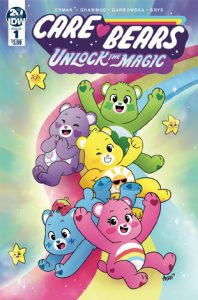
image c. 2019 IDW Publishing
#227 - New Years STREAM! w/ Draggor & Miko - for all things Dragget Show -- www.draggetshow.co…
for all things Dragget Show -- www.draggetshow.com support us on Patreon! -- www.patreon.com/thedraggetshow all of our audio podcasts at @the-dragget-show You can also find us on iTunes & wherever you find podcasts! Dragget Show telegram chat: telegram.me/draggetshow #227 - New Years STREAM! w/ Draggor & Miko - for all things Dragget Show -- www.draggetshow.co…
Along Comes ANOTHER Pony
We’re already finding out more and more about new animated TV series to be looking for as we go galloping into 2020. Series like… It’s Pony, premiering later this month on Nickelodeon. “The 20-episode series follows the comedic adventures of Annie and her best friend, who just so happens to be an enthusiastic, unpredictable, and carefree pony… The series stars Jessica DiCicco (Adventure Time) as Annie, an optimistic and determined farm girl living in the city with her family and best friend Pony; Josh Zuckerman (Strange Angel) as Pony, who is naïve and impulsive, but loves Annie more than anything; Abe Benrubi (E.R.) as Dad, who treats Pony as a nuisance, but recognizes the special bond he shares with Annie; and India de Beaufort (All Hail King Julien) as Mom, who loves Annie and Pony’s relationship and always has a new project in the works.” Animation Scoop has a preview video to check out. [And with that — we wish you a Happy, Safe, and Very Furry New Year!]
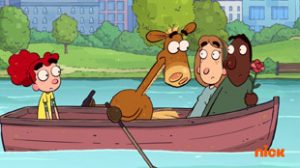
image c. 2019 Nickelodeon
TigerTails Radio Season 12 Episode 16
Quartz Husky [29 Dec 2019] - South Afrifur Pawdcast

We chat to YouTuber and statistician Quartz Husky about their channel, the YouTube platform and social media. Find Quartz Husky on YouTube: https://www.youtube.com/channel/UCmad2GY1CmBMCP0JxkOgEXA And on Twitter: https://twitter.com/QuartzHusky Find us on Twitter: @South-Afrifur, https://twitter.com/southafrifur, on Tumblr, http://south-afrifur.tumblr.com/, and on Facebook, https://www.facebook.com/southafrifur Also, for more local news, check out the Zafur forums! http://forum.zafur.co.za/
But That Trick NEVER Works…
Where would Furry Fandom be without animation? For that matter, where would the Walt Disney Company be without animation? Strange as it may seem today, that very odd notion was on the table back in the 1980’s… and in his new book Pulling A Rabbit Out Of A Hat: The Making Of Roger Rabbit, author Ross Anderson takes a detailed look at what happened instead. “By the 1980s, animation seemed a dying art. Not even the Walt Disney Company, which had already won over thirty Academy Awards, could stop what appeared to be the end of an animation era. To revitalize popular interest in animation, Disney needed to reach outside its own studio and create the distinctive film that helped usher in a Disney Renaissance. That film, Who Framed Roger Rabbit, though expensive and controversial, debuted in theaters to huge success at the box office in 1988. Unique in its conceit of cartoons living in the real world, Who Framed Roger Rabbit magically blended live action and animation, carrying with it a humor that still resonates with audiences. Author Ross Anderson interviewed over 140 artists to tell the story of how they created something truly magical.” The book is available now — and make sure to check out the author’s web site, dedicated to this film and other animation matters.
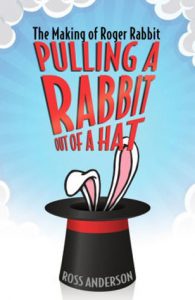
image c. 2019 University Press of Mississippi
S8E21 – Super Sized Tails - Roo and Tugs are joined by Chrono this episode to discuss the subtle cues and interactions many don't realize are all centered around body size and weight. We also do a decade recap after the main topic, so check out the whole
NOW LISTEN!
SHOW NOTES
SPECIAL THANKS
Chrono, our guest.
Miski
Mfalme
Kit
PATREON LOVE
The following people have decided this month’s Fur What It’s Worth is worth actual cash! THANK YOU!
Get Stickered Tier Supporters
Nuka goes here
Kit, Jake Fox, Nuka (Picture Pending), Ichi Okami, Taz
Fancy Supporter Tier
Rifka, the San Francisco Treat and Baldrik and Adilor
Deluxe Supporters Tier
Lokimutt and Guardian Lion and Dusky and Katchshi and August Otter
Plus Tier Supporters
Skylos
Snares
Ausi Kat
Chaphogriff
Lygris
Tomori Boba
Koru Colt (Yes, him)
Bubblewhip
McRib Tier Supporters
Roliga
MUSIC
Opening Theme: RetroSpecter – Cloud Fields (RetroSpecter Mix). USA: Unpublished, 2018. ©2011-2018 Fur What It’s Worth. Based on Fredrik Miller – Cloud Fields (Century Mix). USA: Bandcamp, 2011. ©2011 Fur What It’s Worth. (Buy a copy here – support your fellow furs!)
Space News Music: Fredrik Miller – Orbit. USA: Bandcamp, 2013. Used with permission. (Buy a copy here – support your fellow furs!)
Fifty Sheds of Grey: Kevin MacLeod – Spy Glass. Licensed under Creative Commons: by Attribution 3.0. Visit Incompetech for more.
Patreon - The Tudor Consort, Inflammatus, Creative Commons, 2010
Closing Theme: RetroSpecter – Cloud Fields (RetroSpecter Chill Mix). USA: Unpublished, 2018. ©2011-2018 Fur What It’s Worth. Based on Fredrik Miller – Cloud Fields (Chill Out Mix). USA: Bandcamp, 2011. ©2011 Fur What It’s Worth. (Buy a copy here – support your fellow furs!) S8E21 – Super Sized Tails - Roo and Tugs are joined by Chrono this episode to discuss the subtle cues and interactions many don't realize are all centered around body size and weight. We also do a decade recap after the main topic, so check out the whole
Feed That Monster — Or Else!
Drew Brockington, creator of the CatStronauts series of books (which we talked about!) has returned with a brand new full-color graphic novel called Hangry for younger readers. “When a young lizard monster gets a hankering for his favorite hot dog spot, he takes the train all the way to the city — only to find that the place is closed for vacation. But when this little monster gets too hungry, he starts to get angry. And when he gets hangry, this poor city is at risk of a full-scale monster attack. As his rage swells, so does he, until he’s the size of a skyscraper, and it falls to the citizens to find him some food — and fast!” Look for it in hardcover from Little Brown Books.
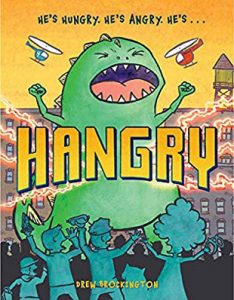
image c. 2019 Little Brown Books
[Live] Ottermated

Neeko wasn’t here so we turned him into a soundboard. We read some average news and then get to a good email discussion.
This episode is sponsored by Twin Tail Creations. Use coupon codes REDWOLF or BLUEFOX to save 15% on silicone products during checkout.
Link Roundup:- Cats movie gets a patch
- BESTARS getting a stage play
- BESTARS gets second season
- Recreational Marajuana becomes legal in Illinois
- Furries raised a lot of money in 2019
- Compiled list of Zooptopia Deleted Scenes
- Baby sonic?
- The weirdest and most bizarre crime stories of 2019
- Dad leaves daughter hilarious instructions to feed fox while he’s on holiday
- Students ‘freaking out’ as teacher uses her own body to teach anatomy class
- Purp Haustier – College dorm concerns (i swear this isn’t boring) [read on air if you want]
Quest of Bat and Lizard
Hey, remember that game we talked about called Yooka-Laylee? Well recently D.M. Cumbo and the folks at Dreamprism Press completed a successful Kickstarter campaign for Yooka-Layle and the Kracklestone, a new hardcover full-color graphic novel. “The story sees Yooka and Laylee plunged into a brand new secret tome world in a race against the evil Capital B to reach the legendary ‘Kracklestone’, an ancient artifact fabled to grant its holder invincibility. To reach the treasure, they’ll run, swim, trip, tumble, and fly through nine distinct, character-filled landscapes. They will encounter friends, foes, and some in-between… including plenty of fan favorites from the game!” The Kickstarter page is still up, and it features lots of art and background materials.
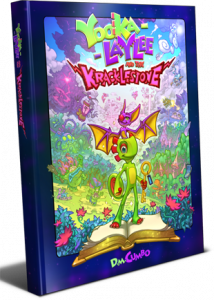
image c. 2019 Dreamprism Press
Canvas Challenge! (EP: 108)

TRD splits into teams to claim throne for paintbrush master and you could win some FREE art! SEE MORE AT: http://www.TheRaccoonsDen.com CONTEST: http://www.TheRaccoonsDen.com/paint FACEBOOK: http://www.Facebook.com/TheRaccoonsDen TWITTER: http://www.Twitter.com/TheRaccoonsDen FURAFFINITY: http://www.FurAffinity.net/user/TheRaccoonsDen INSTAGRAM: http://www.Instagram.com/TheRaccoonsDen #TRDs8 #CanvasChallenge #ArtGiveaway
You’ve Heard Of Them Before
Of late IDW have become the new home for any number of well-known comic book properties, furry and otherwise. And this includes our old buddies the Teenage Mutant Ninja Turtles. Well now IDW have offered up a little bit of when the Turtles were housed at another publisher — and had some rather popular adventures. Look for Teenage Mutant Ninja Turtles: Urban Legends, Volume 1. “This is it, fans! You demanded it—the entire Image Comics TMNT run (a.k.a. TMNT Volume 3) reproduced for the first time ever in full, four-color glory! Join creators Gary Carlson and Frank Fosco as they take the Heroes in a Half-Shell on some of their most amazing, dangerous, and bizarre adventures ever… culminating in three brand-new issues by Carlson and Fosco to properly close out this long-beloved storyline at last!” Check it out over at IDW’s web site.
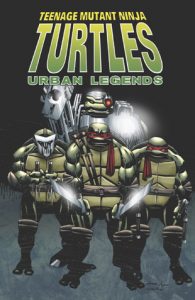
image c. 2019 IDW Publishing
And Yes, He Eats Hot Dogs
Since his appearance in the multiple-award-winning film Spider Man: Into the Spiderverse, Spider Ham (aka Peter Porker) has been gaining in popularity again. Now you can get a big heapin’ helping of the web-pig a new trade paperback from Marvel — Peter Porker, The Spectacular Spider Ham: The Complete Collection Volume 1. “Go whole hog with the Spectacular Spider-Ham’s animal antics! What started as a porcine parody one-shot soon became a hilarious ongoing series full of anthropomorphized adventurers! Peter Porker is a photographer for J. Jonah Jackal’s Daily Beagle — but when danger strikes, he fights crime alongside hirsute heroes such as Hulk Bunny, Captain Americat and the Fantastic Fur! Can Spider-Ham triumph over fearsome foes like Ducktor Doom, Bull-Frog, the King-Pig and the Bee-yonder — while keeping the young Beagle Brigadiers out of trouble and still managing to bring home the bacon? Plus: Thrr, Dog of Thunder stars in “Tails of Arfgard”! Here comes Deerdevil, Mammal Without Fear! Nick Furry, Agent of S.H.E.E.P.! Goose Rider! The invincible Iron Mouse! Croak and Badger! The astonishing Ant-Ant! And more zoological puns!” You heard ’em here. Check it out over at Comixology. [And of course, we wish you a Merry Christmas!]
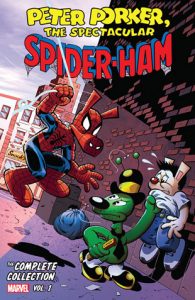
image c. 2019 Marvel Comics

